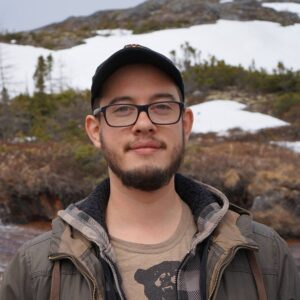New podcast aims at decolonizing vocabulary, one word at a time

By Rick Garrick
MONTREAL — CBC’s new Telling Our Twisted Histories podcast, co-produced in association with Terre Innue, is aimed at people who are interested in decolonizing their vocabulary one word at a time.
“It’s an 11-episode podcast series and each episode focuses around a different word that we’re looking to decolonize,” says Ossie Michelin, director and writer of the podcast and Inuk journalist from North West River, Labrador. “So we asked everybody about each of the words, what they thought, how did this word make you feel, a bit about the history of the word, how do you want to see this word changed, and then we edited it together so each episode focuses on a word.”
Michelin says they had more than 70 conversations with different Indigenous people from 15 Indigenous communities across Quebec, New Brunswick and Labrador.
“The first episode was on the word Discovery,” Michelin says. “If there’s any word out there that’s going to get a reaction from Indigenous people; if you say discovery to them everyone’s going to roll their eyes and groan.”

Michelin says the podcast, which debuted on May 31 with Kaniehti:io Horn as the host, is a chance for people to hear the opinions and perspectives of Indigenous people and how the words affect them.
“We don’t have any experts telling you how you should feel,” Michelin says. “It’s all just regular folks saying, ‘This word, this is how it makes me feel and this is how I react when I hear it and this is what I want people to know about it and this is how I’d like to see it changed.’”
Michelin says they have had responses from Indigenous and non-Indigenous people across the country.
“We’ve been hearing from a bunch of university professors saying that they’re going to incorporate it into their curriculum,” Michelin says. “And I even had a few people from New Zealand comment on Twitter that they really liked this and that they’re interested in hearing more. Indigenous people and folks all over the world have been listening to it, and it’s the top podcast in Canada.”
Michelin says an award-winning French-language version of the podcast, Laissez-nous raconter : L’histoire crochie, was released by Radio-Canada in June 2020.
“It won the best podcast series at the Paris Podcast [Festival], it won a bunch of best new podcast series and Francophone news in Canada,” Michelin says. “So after it had done really well in French, they asked me if I wanted to take the remaining English interviews and do the same thing. So it already had the format and the idea of how to package it.”
Michelin says the same words were used in both of the podcast series.
“When they were making the French version, they recorded all of the English as well and all of the French,” Michelin says. “If you listen to the podcast, you hear a bunch of people responding in French too because we thought it was really important for people who speak English to really hear the perspective of Francophone Indigenous people as well.”
Michelin says his favourite episode was the Family Names podcast, which aired on June 15.
“It’s about how different people got their family names, talking about the history of even having family names in some places,” Michelin says. “Some people talked about reclaiming their family names.”
The podcasts are posted online, with new episodes scheduled to be released weekly on Mondays until August 2.


